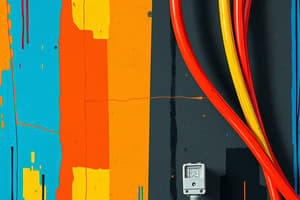Podcast
Questions and Answers
Which component's resistance would directly affect the total resistance of the circuit if it is in series?
Which component's resistance would directly affect the total resistance of the circuit if it is in series?
- Hairdryer (correct)
- Coffee maker (correct)
- Light bulb (correct)
- Electric kettle (correct)
Which law is used to calculate the sum of the current in each branch?
Which law is used to calculate the sum of the current in each branch?
- Kirchhoff's Voltage Law
- Kirchhoff's Current Law (correct)
- Ohm's Law
- Faraday's Law
Given the total voltage of the circuit and the total resistance, which formula is used to calculate the total current?
Given the total voltage of the circuit and the total resistance, which formula is used to calculate the total current?
- $I_{total} = \frac{V_{total}}{R_{total}}$ (correct)
- $I_{total} = \frac{R_{total}}{V_{total}}$
- $I_{total} = V_{total} \times R_{total}$
- $I_{total} = V_{total} + R_{total}$
If the resistance of the light bulb is 10 Ω and voltage across it is 220V, what is the current flowing through it?
If the resistance of the light bulb is 10 Ω and voltage across it is 220V, what is the current flowing through it?
If the electric kettle has a resistance of 15 Ω and the current flowing is 10 A, what is the voltage across it?
If the electric kettle has a resistance of 15 Ω and the current flowing is 10 A, what is the voltage across it?
Which component would not affect the total resistance if placed in a parallel branch?
Which component would not affect the total resistance if placed in a parallel branch?
What happens to the total resistance if more appliances are added in series?
What happens to the total resistance if more appliances are added in series?
What is Kirchhoff's Current Law related to?
What is Kirchhoff's Current Law related to?
Which formula represents the total resistance in a series circuit?
Which formula represents the total resistance in a series circuit?
How is the total current in a parallel circuit calculated?
How is the total current in a parallel circuit calculated?
Flashcards are hidden until you start studying
Study Notes
Elanläggningens Driftsströmmar
- Driftsströmmar refer to the currents that occur during normal operation of an electrical installation, such as when lights are on and machines are functioning as intended.
- These currents are different from short-circuit currents, as they are continuous and last for many hours, putting a different type of load on the installation's components.
- To plan and design an electrical installation, it's essential to consider the driftsströmmar and choose the right size and dimension of components.
Parallellkoppling
- In an electrical installation, all loads are connected in parallel.
- Each central unit is fed via a main line and serves as a distribution point for different groups.
- Each group can then branch out to multiple loads.
Electrical Circuits
- A circuit diagram shows how different components interact with each other.
- The diagram includes elements such as a fuse box, transformer, light bulbs, plug socket, and conductors (wiring).
- The diagram is labeled with technical details, including voltage, current, resistance, and power.
- The circuit is a "group distribution" circuit, meaning it has multiple outlets and feeds multiple outlets.
- The switches on the fuse box control the flow of electricity to the outlets.
- The parallel connection of the outlets means each outlet receives the full voltage from the circuit, regardless of whether the other outlets are in use.
Circuit Elements
- A circuit diagram may include elements such as a coffee maker, light bulb, electric kettle, hairdryer, and power outlet.
- Each element has its own resistance values, current values, and voltage values.
Understanding the Circuit
- The circuit consists of multiple branches, and the sum of the current in each branch is equal to the total current (based on Kirchhoff's Current Law).
- The total resistance of the circuit can be calculated using the formula, $R_{total} = R_1 + R_2 + R_3 +...$.
- The total current can be calculated using Ohm's law, $I_{total} = \frac{V_{total}}{R_{total}}$.
Studying That Suits You
Use AI to generate personalized quizzes and flashcards to suit your learning preferences.




